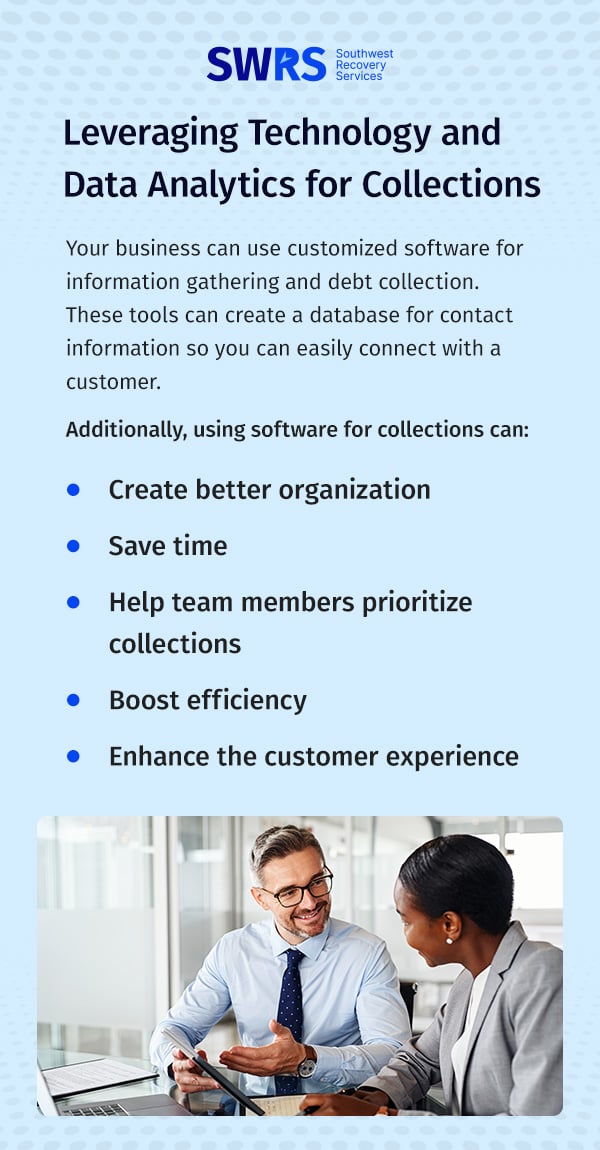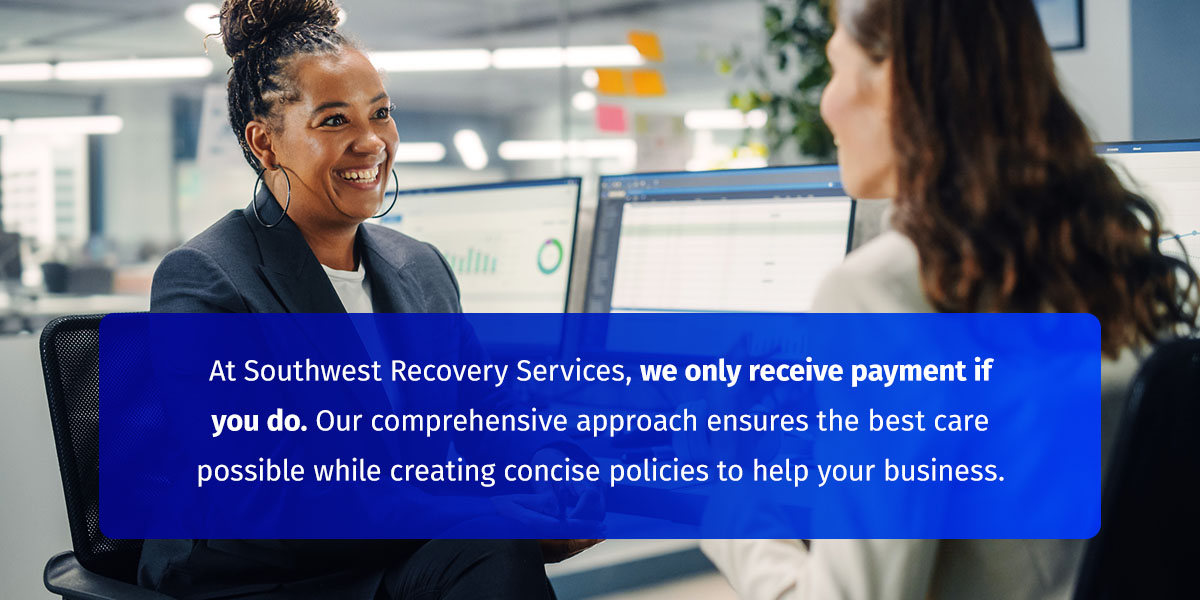- New Customer Inquiries (866) 551-4684
- Customer Service (214) 387-8068
- Make A Payment (866) 558-3328
- Client Portal
- Consumer Support

Maintaining a reliable and steady cash flow is essential for business operations and making strategic decisions. While there are several challenges with the collections process, there are also many ways you can optimize your strategies to enhance experiences for your consumers and team. Our quick debt collection tips can streamline your processes and empower you to find deep financial stability.
The debt collection process involves collecting unpaid debts from borrowers, often after they’ve missed multiple payments. Collection agencies and third-party debt collectors typically handle this process to help your organization manage collection — these companies may pursue a variety of accounts, such as medical bills, credit cards, phone, car or rent payments.
Unpaid invoices can impact your business by harming credit ratings and impacting your reputation. Accelerating collections can improve your financial stability by creating a steady cash flow, empowering you to make forecasts that drive strategic decisions for spending, future growth and opportunities for improvement.
You often start the process by sending a validation notice to ensure the debt is for the designated consumer. After reaching out to the customer, you may receive the payment in full, devise a payment plan or initiate legal action if the consumer does not make a payment. However, several challenges affect the collection process.

Faster debt recovery strategies begin with setting clear payment terms and expectations. Be transparent about late penalties such as enforcing a flat fee, suspension of services or a percentage of the invoice after a specific date.
Review your company’s current policies regarding payments and billing dates to determine where you may need to improve your process. For example, you should consider whether:
Optimizing workflow and task assignment approaches can also streamline your process. Every employee should receive collections training, which should reflect your standardized collections procedures and may include:
Convenient payment options can encourage consumers to act promptly — while paper checks may be a standard option, online payments make for a more efficient process. Allow consumers to pay with a bank account or credit card and consider offering payment plans for customers who may need to pay in increments.
You can also offer rewards for those who pay early. For example, you could promote discounts or waive late charges for customers who immediately resolve their outstanding balances.
Effective communication is essential for building consumer trust and strengthening the collections process. Often, unpaid invoices result from a stressful financial situation or a misunderstanding of your expectations. Collection professionals should seek to understand why a customer has yet to pay their debt and work to find solutions for both parties.
Some consumers may express frustration, which can create tense discussions. It’s essential to use effective negotiation techniques and practice active listening while validating the consumer’s feelings during these situations.
You should also create a systematic approach for communicating with consumers, whether by telephone, email or a combination of multiple methods. Ensure this process is consistent for every customer, and research which methods your audience prefers to maximize efficiency. Automated reminders and notifications can also help consumers remember to pay on time.
In your communications, include the amount owed, a breakdown of the debt, when you plan to escalate the situation, how the reader can pay and the consequences if they do not pay the debt. Refrain from making the communication overly personal or seeming threatening in any way.

Your business can use customized software for information gathering and debt collection. These tools can create a database for contact information so you can easily connect with a customer. Additionally, software can serve as a tracking method to determine which customers have responded and which ones haven’t received your messages, allowing you to create personalized outreach plans.
Plus, machine learning tools can analyze consumer behavior to enlighten you about the best ways to connect with your audience. You can use artificial intelligence to analyze a customer’s salary, age, profession and previous interactions to predict the likelihood of repayment and determine the best approach and channel for getting a positive response.
Additionally, using software for collections can:
Maintaining compliance with the necessary guidelines and regulations throughout your collections processes is vital. You must familiarize yourself and your team with debt collection laws. The Fair Debt Collection Practices Act (FDCPA) regulates how you can operate regarding debt collection and prevents companies from using deceptive or unfair practices to collect debts.
The FDCPA determines how often you can call a consumer to collect debts, highlights procedures for validating debts and notifying consumers, requires record retention, and prohibits misleading representations. You must adhere to these regulations to avoid legal action. Always record and document all collection activities so you can show your compliance. If you have questions or need to verify a practice, seek legal advice from a professional.

Partnering with a debt collection agency can bring several benefits to your business:
When choosing a partner, it’s essential to understand the terms and conditions of collaboration. For example, at Southwest Recovery Services, we only receive payment if you do. Our comprehensive approach ensures the best care possible while creating concise policies to help your business.
After selecting a partner, you should evaluate their performance to determine whether they meet your needs as expected. Monitor your recovery rate, recovery time, collection fees and transparency. Some questions that could be helpful to ask yourself include:
After implementing a new procedure, evaluate your success to determine what’s working and which inefficiencies you can address. You can seek continuous improvement by:
A proactive and efficient approach to collections is vital for your business. Effective processes can help you maintain consumer relationships, improve your cash flow and cut repetitive tasks for your team. Leveraging advanced technology, enhancing communication, ensuring compliance and streamlining your effective processes can quickly boost your operations while improving the customer experience.
At Southwest Recovery Services, we understand the importance of proper collections processes. We’re a nationally recognized financial services and BPO organization with nearly two decades of experience helping small and large businesses find innovative solutions. Our team works diligently to protect your business while strengthening your relationships and processes.
With us, there’s no risk because we don’t get paid unless you do. Contact our team for collections process improvement.


We make it fast and easy to refer past due and delinquent accounts to our professional recovery agents. You decide the range on what you will accept on each case, and you ONLY pay a percentage of what we actually collect to resolve the case. Ready to get started, or want to learn more? Fill out this form and a dedicate account manager will call you to get started.